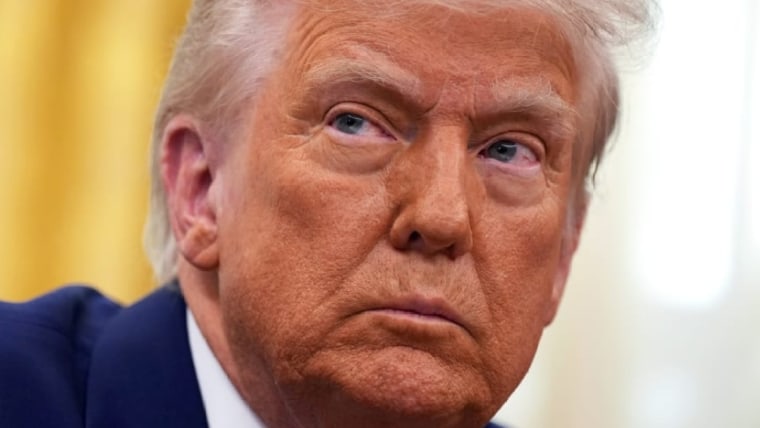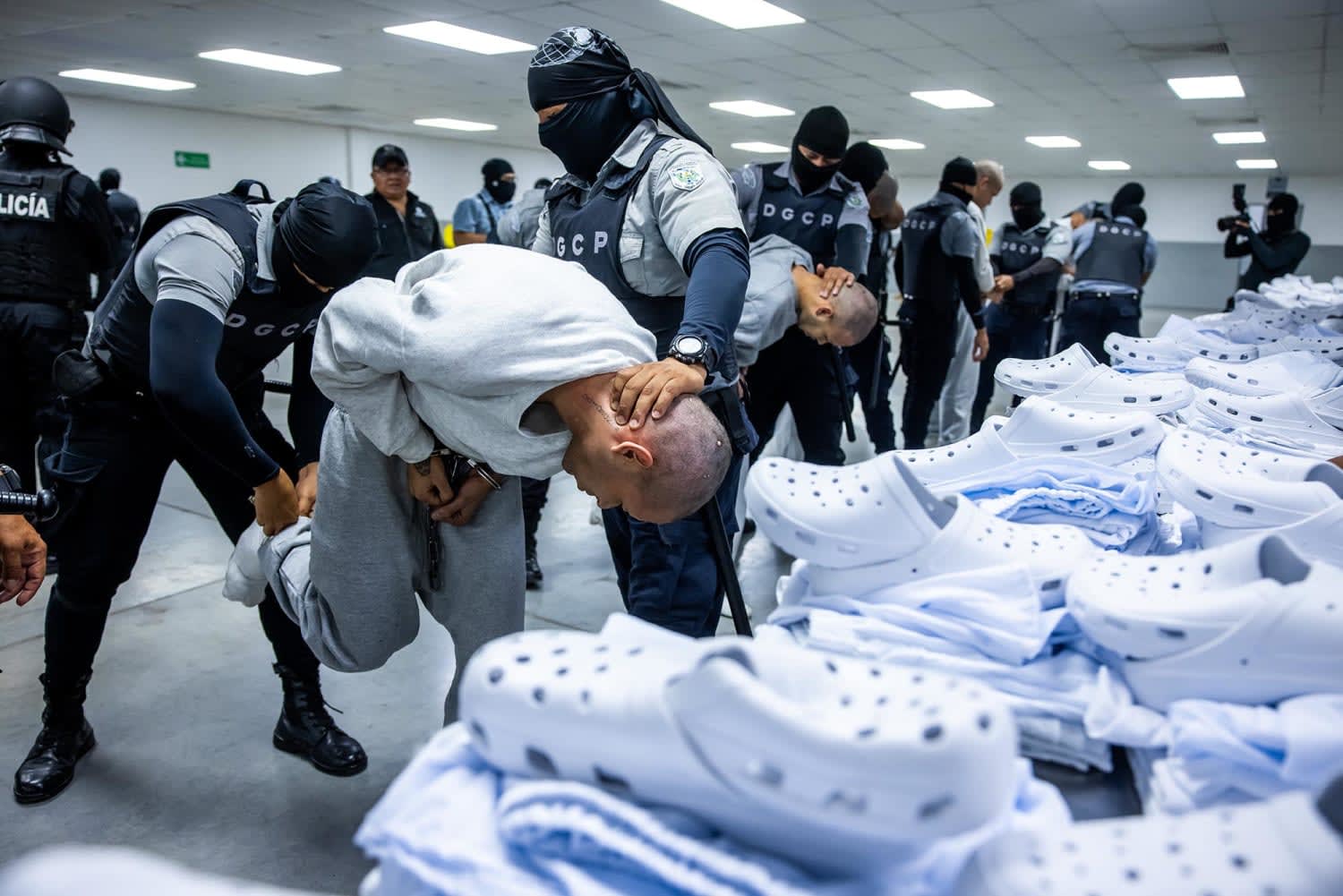Luigi Mangione sits in court, looking off to the side
Author: Ross Mulcahy
-

There’s no ambiguity — Trump can’t run for a third term. Period.
President Donald Trump said “I’m not joking” when he told NBC News on Sunday that his allies have been pushing him to run for a third term — but added that “it is far too early to think about it.” I disagree: It is not at all too early to think about whether and how a president who attempted to throw out an election loss to retain power wrongly attempts to stay in power into 2029 and beyond.
Though Trump’s team routinely homes in on ambiguities in the law to find loopholes that let them run roughshod over our political norms, he’ll find that there’s no ambiguity in the 22nd Amendment, possibly the clearest limit on the presidency the Constitution imposes.
“No person shall be elected to the office of the President more than twice,” it reads, “and no person who has held the office of President, or acted as President, for more than two years of a term to which some other person was elected President shall be elected to the office of the President more than once.”
There’s no foothold for any alternative reading of the language, and Trump’s usual wheedling and plotting to get around any limitations on him should instantly fall flat, far before it ever reaches the Supreme Court.

Then, again, the language of the 14th Amendment is very clear about banning insurrectionists from holding federal office. But when the Colorado Supreme Court cited that prohibition and ruled that Trump’s Jan. 6-related activities made him ineligible for that state’s ballot, the conservative U.S. Supreme Court helped Trump get around that constitutional roadblock.
Trump’s lawyers argued that three key phrases — “having previously taken an oath,” “as an officer of the United States” and “engaged in insurrection” — didn’t apply to Trump. They combined ahistorical arguments with bad faith readings of the text, and specific word choice was interrogated to within an inch of its life. The court’s opinion in Trump v. Anderson — issued unanimously — sidestepped his lawyer’s outlandish readings of the text and found that while states can use Section 3 to block state or local office-seekers from the ballot, they can’t block a federal candidate.
There doesn’t seem to be much room for Trump to find a similar weak point in the 22nd Amendment, even if he demands that the Justice Department — which now includes several of the lawyers who helped keep him on the ballot last year — find a way for him to run again.
Unlike the 14th Amendment, which was drafted over 100 years ago, the 22nd Amendment was written and ratified within some Americans’ living memory. There’s no mystery about what prompted its addition to the Constitution. In response to the outbreak of World War II, President Franklin D. Roosevelt chose to shatter the norm of U.S. presidents’ serving only two terms and ran for and won a third term. He then won a fourth presidential election in 1944, which shifted the politics of the issue dramatically.
The 22nd Amendment should stand as a testament to Congress seeing a long-established norm being undone and seeking to make it ironclad in law.
Congressional Republicans and conservative Southern Democrats feared Roosevelt’s unprecedented four-term stretch could start a trend. Even though World War II was fresh in their minds, they made no exception that allowed for a two-term president to run again if the country is at war. Notably, they also limited the number of times a vice president who assumed the presidency could run again.
If anything, the 22nd Amendment should stand as a testament to Congress seeing a long-established norm being undone and seeking to make it ironclad in law. But despite the law’s being unequivocal, Trump told NBC News there “are methods which you could” use to seek a third term. He agreed that a hypothetical put before him would count, one in which he and Vice President JD Vance swap places on the ticket before Vance hands him back the top job.
In that, he seems to be taking inspiration from Russian President Vladimir Putin. After two terms, and barred from a third consecutive run, Putin became Russia’s prime minister in 2008, allowing Dmitry Medvedev to assume the presidency. Putin quickly changed his mind, swapping jobs back with Medvedev in 2012, and has remained president ever since.
While I stand by my belief that Trump should have been disqualified from running again under the 14th Amendment, I can grudgingly admit that there were enough novel questions involved that Trump’s lawyers were able to craft a whole new subgenre of historical fiction in answering them. There is no such room for imagination in any case in which there’s even a possibility of Trump’s overstaying his term in office. The text of the 22nd Amendment is clearer than any past constitutional challenge he has instigated. And every judge he encounters is duty-bound to tell him so.
-

ICE admits to ‘administrative error’ in deporting man to Salvadoran prison
Alleged members of the Venezuelan criminal organization Tren de Aragua and from the Salvadoran gang MS-13 being subdued upon their arrival at the Terrorism Confinement Center in the city of Tecoluca, El Salvador, in an image released on March 31.
-

America’s other checks and balances are still working on Trump
To borrow an old joke from President Donald Trump’s first term: Welcome to the resistance, bond traders.
The financial professionals who buy and sell U.S. Treasury bonds for major investors on the secondary market helped force the president to back down from imposing a disastrous set of tariffs on almost every country in the world.
It was a refreshing reminder that checks and balances can still work, even if they aren’t the ones described in your civics class.
Trump confirmed Wednesday that bond traders were at least partially behind the reversal, telling reporters that he had been watching the bond market and saw that investors were “getting a little queasy.” Wall Street also gave them credit. “The Bond Vigilantes have struck again,” market researcher Ed Yardeni wrote. A reporter for the Financial Times even offered an apology for having doubted the bond traders earlier.
To be clear, bond traders aren’t some shadowy cabal trying to take down the Trump presidency. They’re just a bunch of quants responding to market conditions as they try to figure out how to make their clients slightly richer that day. But at a time when so many other institutional actors — from white-shoe lawyers to university presidents — are failing at their jobs, it was nice to see.
A key check on Trump’s financially illiterate plan to roll back 20th century economics turned out to be the simple 10-year Treasury bond.
As it turned out, a key check on Trump’s financially illiterate plan to roll back 20th century economics turned out to be the simple 10-year Treasury bond.
The federal government issues these bonds four times a year, with interest rates set by how much buyers are willing to bid at an auction. That rate is an important benchmark that affects how much you pay each month on everything from your credit card bill to your car loan to your mortgage.
That’s why it was so important when bond traders started, in Trump’s words, “getting a bit yippy.”
-
There’s a reason Elon Musk is taking today’s Wisconsin election so personally
Image: Elon Musk Holds Town Hall Ahead Hotly Contested Wisconsin State Supreme Court Election
-
The Yankees aren’t technically cheating with new ‘torpedo bats,’ but they are destroying a myth
Austin Wells #28 of the New York Yankees hits a home run in the first inning against the Milwaukee Brewers at Yankee Stadium on Saturday in New York City.



